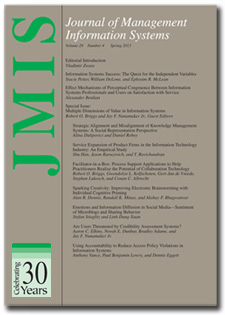Why do Family Members Reject AI in Health Care? Competing Effects of Emotions
IF 5.9
2区 管理学
Q1 COMPUTER SCIENCE, INFORMATION SYSTEMS
引用次数: 3
Abstract
ABSTRACT Artificial intelligence (AI) enables continuous monitoring of patients’ health, thus improving the quality of their health care. However, prior studies suggest that individuals resist such innovative technology. In contrast to prior studies that investigate individuals’ decisions for themselves, we focus on family members’ rejection of AI monitoring, as family members play a significant role in health care decisions. Our research investigates competing effects of emotions toward the rejection of AI monitoring for health care. Based on two scenario-based experiments, our study reveals that emotions play a decisive role in family members’ decision making on behalf of their parents. We find that anxiety about health care monitoring and anxiety about health outcomes reduce the rejection of AI monitoring, whereas surveillance anxiety and delegation anxiety increase rejection. We also find that for individual-level risks, perceived controllability moderates the relationship between surveillance anxiety and the rejection of AI monitoring. We contribute to the theory of Information System rejection by identifying the competing roles of emotions in AI monitoring decision making. We extend the literature on decision making for others by suggesting the influential role of anxiety. We also contribute to healthcare research in Information System by identifying the important role of controllability, a design factor, in AI monitoring rejection.为什么家庭成员拒绝医疗保健中的人工智能?情绪的竞争效应
人工智能(AI)能够持续监测患者的健康状况,从而提高他们的医疗保健质量。然而,先前的研究表明,个人抵制这种创新技术。与之前调查个人自己决定的研究相反,我们关注的是家庭成员对人工智能监测的拒绝,因为家庭成员在医疗保健决策中发挥着重要作用。我们的研究调查了情绪对拒绝人工智能监测医疗保健的竞争影响。基于两个基于场景的实验,我们的研究揭示了情绪在家庭成员代表父母的决策中起决定性作用。我们发现,对医疗保健监测的焦虑和对健康结果的焦虑降低了对人工智能监测的排斥,而监测焦虑和委托焦虑则增加了对人工智能监测的排斥。我们还发现,对于个人层面的风险,感知可控性调节了监控焦虑与拒绝人工智能监控之间的关系。我们通过识别情绪在人工智能监控决策中的竞争角色,为信息系统拒绝理论做出了贡献。我们通过提出焦虑的影响作用来扩展关于他人决策的文献。我们还通过识别可控性(设计因素)在人工智能监测拒绝中的重要作用,为信息系统中的医疗保健研究做出了贡献。
本文章由计算机程序翻译,如有差异,请以英文原文为准。
求助全文
约1分钟内获得全文
求助全文
来源期刊

Journal of Management Information Systems
工程技术-计算机:信息系统
CiteScore
10.20
自引率
13.00%
发文量
34
审稿时长
6 months
期刊介绍:
Journal of Management Information Systems is a widely recognized forum for the presentation of research that advances the practice and understanding of organizational information systems. It serves those investigating new modes of information delivery and the changing landscape of information policy making, as well as practitioners and executives managing the information resource.
 求助内容:
求助内容: 应助结果提醒方式:
应助结果提醒方式:


